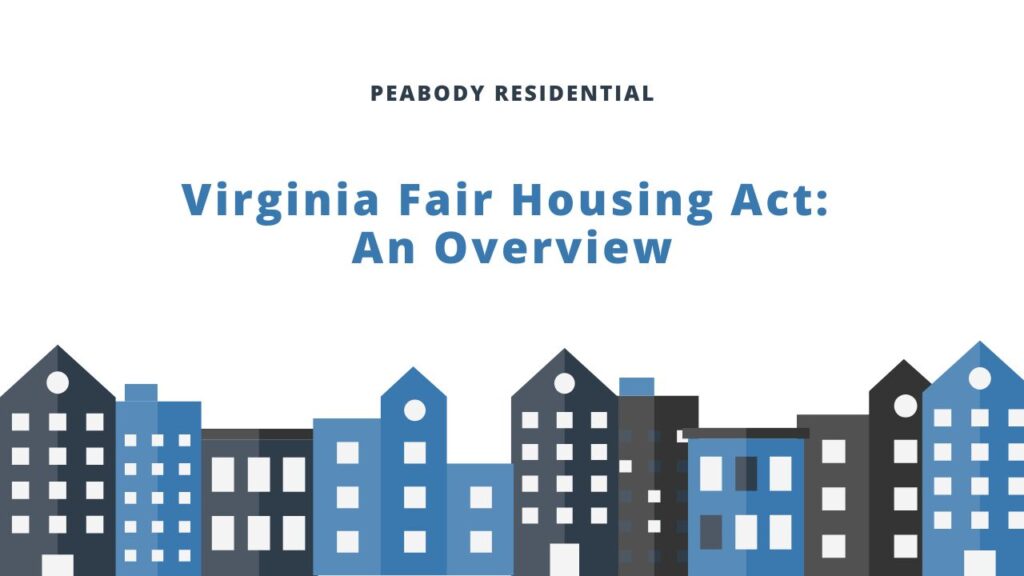To be a successful rental property owner in Virginia, you have to get certain things right. Among these is treating your resident fairly, equally, and respectfully. This is not only the right thing to do, but also required under the landlord tenant laws.
The Fair Housing Act in Virginia requires property owners to adhere to this anti-discrimination law to the letter, as it dictates numerous aspects of the landlord-tenant relationship.
Specifically, it requires property owners to treat residents fairly regardless of certain protected classes, such as race, color, and nationality. It’d be unlawful, for instance, for a property owner to use a resident’s protected class as a basis for favoritism or discrimination.
With that in mind, here is a guide to the Fair Housing Act in Virginia according to Peabody Residential. We’ll discuss all the important basics to help you familiarize yourself with this important legislation.
Get Your Free Rental Analysis Today!
What Is the Fair Housing Act?
The Federal Fair Housing Act is a landmark law that became law on April 11th, 1968. Also known as Title VIII of the Civil Rights Act, it prohibited discrimination in the rental and sale of housing based on certain protected classes.
The protected classes are 7 in number: race, color, religion, nationality, sex, familial status, and disability. The primary goal of the act was to stamp out discriminatory practices that had historically led to segregated communities all over the country.
While the federal law covers specific categories, some states, like Virginia, saw the need to expand the list of classes to fit their local needs and concerns. This is what brought about the Fair Housing Act in Virginia. With this law, Virginia aims to create a more inclusive and equitable housing market for all its residents.
What Are the Protected Classes Under the Fair Housing Act in Virginia?
In Virginia, it’s illegal for a property owner to discriminate against a resident based on certain protected classes. As mentioned, at the federal level, 7 protected classes exist. These apply to all 50 US states.
At the state level, additional protections are sexual orientation, source of funds, military status, and gender identity. This brings the total number of protected classes in Virginia to 11.
The Fair Housing Act in Virginia applies to a host of housing transactions, including the following:
- Rental transactions
- Sale of homes
- Mortgage financing
- Rental insurance
- Rental advertisements
The following are some examples of housing discrimination in regards to property owners and residents:
- Rejecting someone a housing opportunity because of their skin complexion.
- Treating a resident differently because they practice a certain religion.
- Refusing to rent someone your Virginia rental property because of their ethnicity.
- Preferring to rent out your property to one gender over another.
- Denying an elderly person (an individual over the age of 55) housing because of their age.
- Refusing to rent to someone because they have children or are pregnant.
- Denying someone the opportunity to rent out your property because they have a physical or mental disability.
- Rejecting someone’s application because of their sexual orientation.
- Rejecting an applicant because they are a member of the armed forces or reserves.
Other examples of fair housing law violations include:
- Providing a resident of a certain race or religion a more desirable unit.
- Asking prospective residents discriminatory questions when screening them.
- Not providing a disabled potential resident reasonable accommodations. It’d also be unlawful to ask them to pay an extra fee or deposit for their service dog or companion animal.
- Discriminating against a resident based on their income source. As long as it’s lawful, a potential resident’s income source should not be a basis for discriminatory practices against them.
Housing Exemptions Under the Fair Housing Act in Virginia
The following are some of the common fair housing law exemptions for property owners in Virginia:
- An Owner of a Building With Four or Fewer Units: The owner would qualify for exemption if they lived in one of the units as a primary residence.
- An Owner of a Single-Family Home: You’d qualify for an exemption if you only owned three or fewer single-family homes and managed the properties yourself. This exemption, however, doesn’t apply to duplexes, triplexes, or other multi-family homes.
- A Property Owner Who Rents to a Member of Their Family: The member must be an immediate one and not from extended family or unrelated individuals.
- Homes Operated by Religious Organizations or Clubs: These are allowed to give preference to their membership.
- Elderly Care Homes: Such homes are only meant for senior citizens.
What Can a Property Owner Do to Stay Compliant With the Fair Housing Act in Virginia?
The primary goal is to ensure that you treat all residents equally and fairly in all interactions you have with them. There are a few things you can do to ensure utmost compliance in this regard:
- Screen all would-be residents fairly and consistently. Don’t subject different residents to different screening criteria.
- Market the property fairly without showing any preference or limitation to any member of a protected class.
- Enforce all terms of the lease consistently without bias or favor, from evictions to security deposits.
- Allow disabled residents to have their service dogs or companion animals without any conditions.
- Enforce the lease justly.
Bottom Line
As a property owner in Virginia, you must treat your residents fairly per the state’s fair housing laws to be successful. This will help you to not only stay legally compliant, but also attract and retain quality residents.
If you have a question or need the expert help of a professional, look no further than Peabody Residential. We are one of the best-performing property management companies in Northern Virginia. Get in touch to learn more!
Disclaimer: Please note that the information provided in this blog is intended for general guidance and should not be considered as a replacement for professional legal advice. It is important to be aware that laws pertaining to property management may change, rendering this information outdated by the time you read it.




